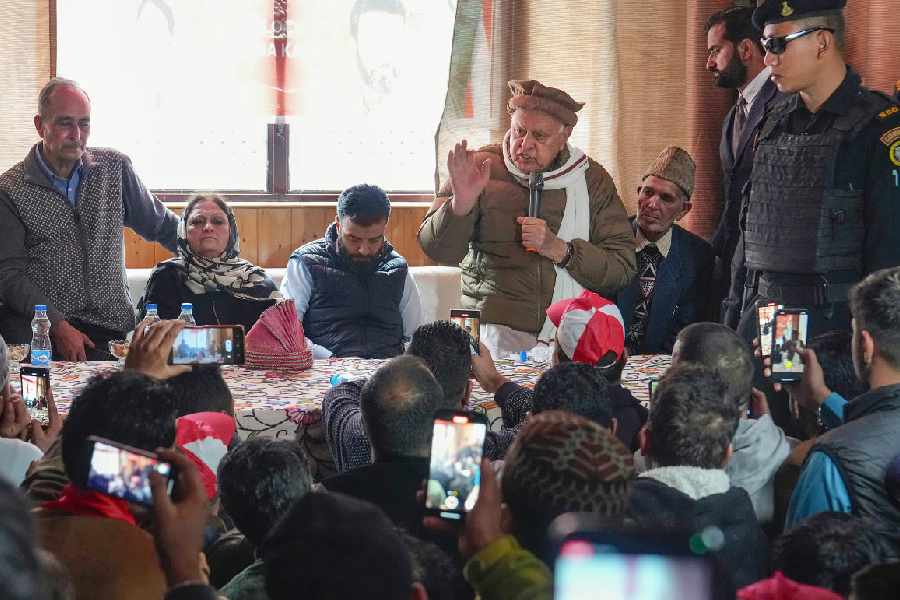Ghulam Nabi Shaheen, an avowed Azaadi advocate, is looking to shed his aversion to elections driven by a stifling bureaucracy and the absence of a democratic space.
At 60, Shaheen should be lucky to have tasted “the fruit of democracy” at least once in his life by pressing the EVM button.
However, there is an army of men and women in Kashmir, mostly in urban centres such as Srinagar, Baramulla, Sopore or Anantnag, who have never voted because of their ideological upbringing. Voting to them was a vote for India, which they firmly avoided.
The scrapping of the special status in 2019, the splitting and downgrading of the state into two Union Territories, a slew of accompanying “farmans” and denial of the right to dissent may prompt many of them to vote this time.
Anantnag, Srinagar and Baramulla witnessed a less-than-normal turnout — 8.96 per cent, 14.43 per cent and 35.89 per cent, respectively — in the 2019 Lok Sabha polls. The 2016 agitation following the death of Hizb militant Burhan Wani had significantly dulled the enthusiasm among voters.
The turnout in the 2014 Assembly elections in Kashmir was an impressive 57 per cent, but it was largely driven by the voters in villages.
Political parties this time expect a decent turnout across Kashmir, including urban centres, but the chronic election aversion among some might get in their way.
The number of voters in Jammu and Kashmir has swelled to 86.96 lakh from 77.43 lakh in June 2019 (according to Union home ministry’s reply in Parliament), an increase of around 9.5 lakh voters or 12.30 per cent in five years. It is unclear how many are non-local voters although officials claim the surge is driven by local enthusiasm.
India’s voter population has increased by 8 per cent from 89.6 crore to 96.8 crore during the same period.
“People should vote this time. It is our democratic right. We are witnessing a bureaucratic rule with no access to authorities. Moreover, people can no longer express their opinions freely,” Shaheen, a senior office-bearer of the Kashmir High Court Bar Association who has campaigned in favour of election boycotts in the past, told
The Telegraph.
“I last voted in 1987. I have made up my mind to vote this time but a lot will depend on the availability of good candidates. Unless of course, if some last-minute hitch prevails,” he added.
On why he boycotted elections in the past, Shaheen said he advocated participation in the polls in their closed-door meetings but had to follow the consensus.
“I always believed bad democracy is better than no democracy. Azaadi or no Azaadi is a different issue,” he said.
Unlike many others, Shaheen believes Jammu and Kashmir is unlikely to get back Article 370 after the Supreme Court approved the Centre’s move.
“But other things like statehood, your own government (along with land and job protection) are possible,” he said.
The Assembly elections in 1987, with an impressive 75 per cent turnout, was a watershed event in Kashmir that saw different political and religious parties under the banner of the Muslim United Front take on the National Conference-Congress alliance. The election was allegedly rigged in several constituencies, becoming one of the triggers for militancy.
Today, many are batting for the INDIA bloc of which the NC and the Congress
are parts.
Student activist Nasir Khuehami, 26, has also joined the long list of boycotters willing to vote, citing the absence of a democratic space. “I had different reasons not to vote. But this time I aspire to get back all that we lost in 2019. Of course, that is my top priority,” he said.
In Srinagar’s downtown, the old cradle of the Azaadi movement and home to more than half a million people, there are barely any signs of an election barring a lone rally by the NC on Saturday.
Its congested localities remain insulated from the rough and tumble of polls but mask a deep urge to vote. People are willing to talk as long as their cloak of anonymity remains intact. “I have seen so many elections come and go but I never voted. Azaadi remained a mirage. But look what is happening in Pakistan, a country that we madly loved and followed. They stood silent as we were disrobed,” an employee in a government bank, in his 50s, said.
“I have come to realise that India is a better bet for us as long as communal elements are kept at bay. I am waiting for the elections and my wife and me will be among the first to vote,” he said.
A retired professor in his 70s said he has not hated anybody more than NC founder Sheikh Mohammad Abdullah, accusing him of putting Jammu and Kashmir in India’s lap. “The situation now is such that our Muslim identity is under assault. Almost all the departments are helmed by non-Muslims and you do not have the right even to criticise it. The future of our youth is at peril,” he said.
“That is why I want to have a powerful regional party. If I vote, I will vote for the National Conference, the party I have hated all along. My chances to vote are 50-50 but I pray I go on a stroll on election day with some like-minded men and quietly cast my vote without anybody seeing us,” he added.
Kashmir votes on May 13, 20 and 25











